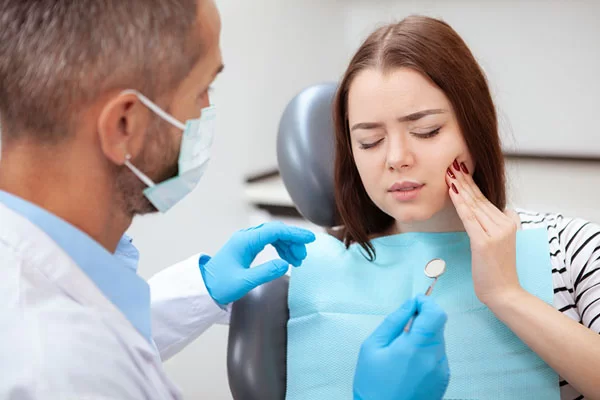Are You Experiencing a Dental Emergency in Farmington?
Dental emergencies can strike without warning, causing severe pain and significant discomfort. Recognizing these urgent situations and seeking immediate dental care can prevent serious complications, preserve your oral health, and quickly alleviate pain.
At Pinnacle Dental, our Farmington, CT, emergency dentist is committed to helping patients identify when they’re experiencing a true dental emergency so they can get timely treatment at our dental office. Call our Farmington dental office at (860) 470-3660 if you’re experiencing a dental emergency.
Why Recognizing Dental Emergencies Matters
Identifying dental emergencies promptly is crucial for maintaining good oral health and overall well-being. When dental emergencies occur suddenly, they often cause severe tooth pain, discomfort, and potential long-term damage if left untreated.
By recognizing dental emergencies early, you can take immediate action, seek appropriate emergency dental care, and minimize the risks of developing more serious dental infections or complications that could impact your dental health for years to come.
Common Signs of a Dental Emergency
Severe Tooth Pain or Persistent Toothache
Intense and persistent tooth pain that doesn’t respond to over-the-counter pain relievers often indicates a dental emergency. If you’re experiencing excruciating dental pain that continues to worsen, contact our Farmington emergency dentist immediately. A severe toothache may signal an infection, tooth abscess, severe decay, or fractured tooth requiring prompt treatment.
Swelling and Bleeding Gums
Swollen and bleeding gums can indicate both gum disease and a potential dental emergency. If your gum tissue becomes severely swollen, tender, and bleeds excessively, it could signal an advanced gum infection or dental abscess. Emergency dental care and prompt treatment are necessary to prevent the infection from spreading and causing more serious complications.
Knocked-Out Tooth (Dental Trauma)
Having a tooth knocked out due to an accident or dental trauma constitutes an immediate dental emergency. If this happens:
- Carefully pick up the tooth by the crown (avoid touching the tooth root)
- Gently rinse with water if dirty (don’t scrub or remove attached tissue)
- Try to reinsert the tooth into its socket
- If reinsertion isn’t possible, place the tooth in milk or a tooth preservation kit
- See an emergency dentist as soon as possible, ideally within 30 minutes
Time is critical for successful reimplantation and preventing tooth loss.
Loose or Partially Dislodged Tooth
A loose or partially dislodged tooth requires immediate attention. If a tooth is knocked partially out of its socket, try to gently push it back into place and bite down on a clean cloth to stabilize it. Seek emergency dental treatment at Pinnacle Dental immediately to secure the tooth and prevent further damage that could lead to tooth loss.
Uncontrolled Oral Bleeding
Oral bleeding that doesn’t stop after applying pressure for 15 minutes or is excessive signals a dental emergency. Uncontrolled bleeding from the mouth could indicate a severe injury, advanced gum disease, or other serious dental issues. Contact our emergency dentist at (860) 470-3660 or visit a local emergency dental clinic for immediate care.
Cracked, Broken, or Fractured Tooth
A cracked, broken, or fractured tooth isn’t just painful—it requires immediate dental treatment. Depending on the severity, treatment options may include dental bonding, dental restorations, or a dental crown to restore the tooth’s integrity. Using a cold compress can help manage pain and reduce swelling while you seek emergency dental care.
Dental Abscess or Severe Infection
A dental abscess is an infection that occurs around the tooth root or between teeth and gums. Signs include:
- Severe, persistent, throbbing toothache
- Sensitivity to hot or cold temperatures
- Fever
- Facial swelling or jaw pain
- Tender, swollen lymph nodes
- Sudden release of foul-tasting fluid if the abscess ruptures
Left untreated, dental infections can spread and potentially become life-threatening infections requiring more invasive procedures.
Sudden Sensitivity to Temperature
Tooth sensitivity that occurs suddenly and severely might indicate a broken dental filling, tooth fracture, or infection. It could also mean you have an exposed tooth root due to receding gums or periodontal disease. While mild sensitivity might not constitute an emergency, sharp pain when consuming hot or cold items warrants prompt attention.
Facial or Jaw Swelling
Swelling in the face, jaw, or neck can result from an infected tooth, an impacted wisdom tooth, or cellulitis (infection of soft tissues). Such infections can spread rapidly and become serious if not treated promptly with appropriate dental treatment, which might include antibiotics and dental procedures.

Frequently Asked Questions
Dental emergencies include severe tooth pain, knocked-out teeth, loose teeth, persistent oral bleeding, broken teeth, dental abscesses, and severe gum infections. These conditions require immediate attention from an emergency dentist to prevent further complications and alleviate pain.
Yes, most broken teeth can be repaired using various dental treatments recommended by the American Dental Association. The appropriate treatment depends on the extent of the damage. Your dentist will evaluate your specific situation to determine the best solution, which might include dental bonding, crowns, or other dental restorations.
If a tooth is knocked out due to dental trauma, follow these steps for the best chance of saving it:
- Gently pick up the tooth by the crown (the visible part)
- If dirty, rinse it gently with water (don’t scrub or remove tissue)
- Try to reinsert the tooth into its socket
- If reinsertion isn’t possible, place the tooth in milk or a tooth preservation kit
- Visit an emergency dentist immediately, ideally within 30 minutes
Trust Our Emergency Dentist at the First Sign of Trouble
Identifying dental emergencies is essential for protecting your oral health and overall well-being. By recognizing signs such as severe tooth pain, knocked-out teeth, or persistent bleeding, you can take immediate action and seek professional emergency dental care before complications worsen.
Don’t wait until a mild toothache becomes a serious dental issue. Contact our Farmington dental office at (860) 470-3660 to schedule an emergency appointment and get the care you need. We proudly serve patients in Farmington, Plainville, New Britain, Hartford, Newington, and surrounding areas with prompt treatment for all dental emergencies.
